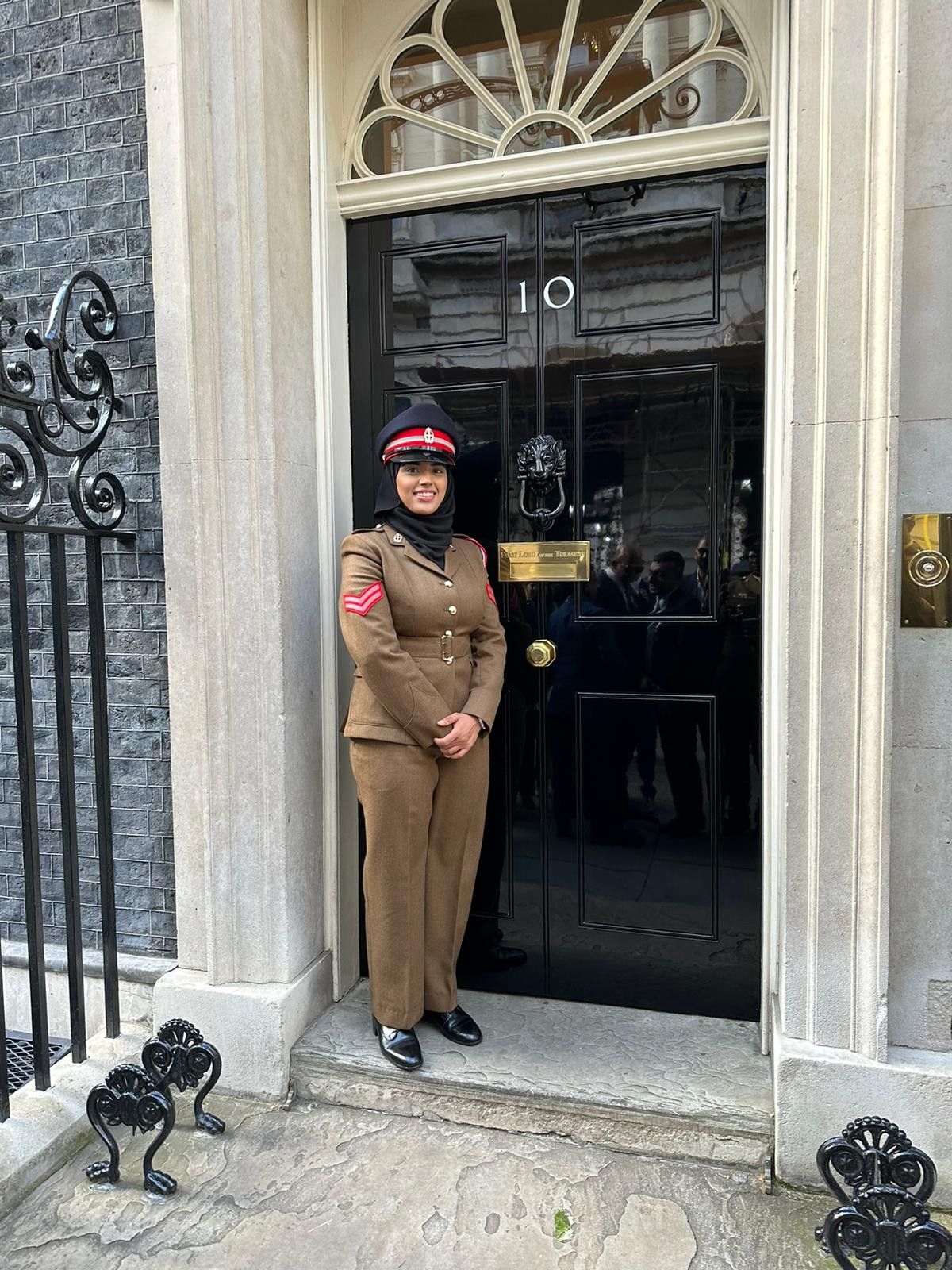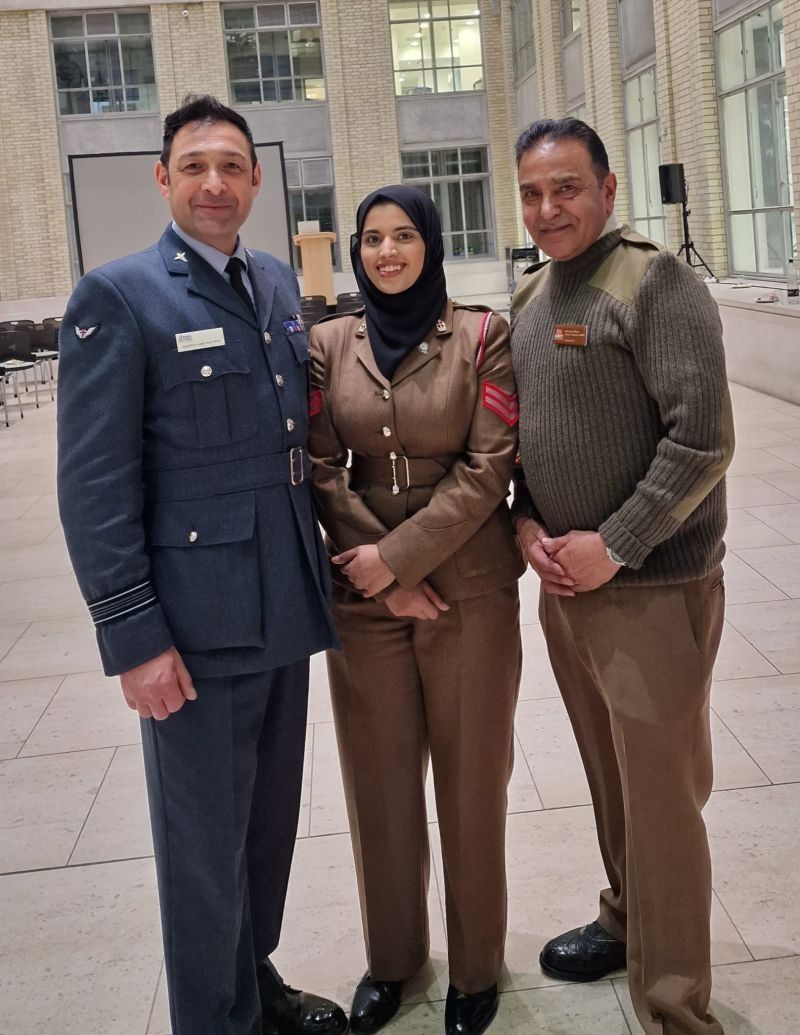When Iqra Shazadi found out that no soldier had ever worn the hijab in the British Army, she was shocked, and this motivated her further to achieve her desire to join the army and do something more.
She realised it was her chance to create “her story”.
“There is a word in the English dictionary and it’s ‘history’. When you break the word history, it becomes two words – ‘his’ and ‘story’, Shazadi, an Army nurse, told Eastern Eye.

“I wanted to write ‘her story’, a story of a little girl who chose to fight for her dreams and made a difference.
“Instead of waiting for another female to join and read about her experience of being in the Army and being able to practice Islam, I decided to do it myself because you can’t expect change if you are not willing to be a part of that change.
“I joined the Army to create ‘her story’, so when there is another Iqra, she can walk into the same Army and say ‘I belong here. I can make this place a home’.”
The 27-year-old’s journey to a career in the military was far from an easy one. Coming from a conservative Muslim family, she needed to convince her parents that she could maintain her religious and cultural values while being a solider.
“My father is very conservative, extremely strict. My mum is exactly the same, but she’s more understanding. If I sit her down and explain to her everything, she’ll understand,” she said.
“During this whole process, the one person who was my backbone was my sister. She was absolutely my rock to get to where I wanted to be.”
Shazadi’s fascination with the Army started when she used to see a sergeant walking in and out of a career’s office on her way home from school.
She said she asked herself, “What do I need to do to wear that uniform?”
Though she could only join the armed forces after her 18th birthday, Shazadi started training for it straight away by building her physical fitness. She had a PE teacher at her school who had been in the military and he supported her by allowing her to go on long runs in the grounds after school had closed.
But after she finished secondary school, she needed to find other ways to continue her training.
“I was like ‘oh God, now where am I going to run?’ I could see the little freedom I had walking away right in front of my eyes, because running on the road was taboo. So I decided ‘ok, before fajr (dawn prayer) times, when everybody was asleep, I used to sneak out the house to go for a run and then come back. My dad woke up for fajr and made sure everyone in the house was up as well. My sister was my cover and used to say that I would be up in a few minutes.”
Shazadi reveals that her life experiences were limited when she lived with her parents, saying “prior to joining the Army, my longest journey was from upstairs to downstairs to my dad’s car to go to school. I didn’t know how to book a train ticket at one point.”
The journey she wanted to go on, she hoped, would lead her to becoming a nurse.
“There is a misconception that people join the military because they don’t have good grades, or they just failed at everything else and are going to try their luck in the Army. I kept hearing this from anyone and everyone. I knew it wasn’t and isn’t true, because we have doctors, we have Army medical services, we have engineers, we have military lawyers – we have so many different trades,” she said.
“We have careers that require you to be professionally qualified, whether that’s a three-year degree course or masters. That was something lacking, people did not know this.”
After completing her initial training, Shazadi joined the Army as a medic and later completed a three-year nursing degree at Birmingham City University.
“Being a nurse was always a dream I never thought I could achieve because of the family I come from. I am the first female in my family to graduate in the UK or even go to university,” said Shazadi.

She is currently working as a nurse at Frimley Park Hospital in Surrey. “As a military nurse, we work in the hospitals and are part of patient care,” she said.
“I’m also a soldier first. I keep up with my green skills, our military skills. If we need more time, we can request it to gain more experience and practice our skills.
We never ever lose military skills.”
Shazadi admitted that when she first joined the Army, it was a difficult time as she was known as the “hijab girl”. She received many questions from fellow recruits and trainees such as ‘Who is she? Why did she join? What is she doing here? Is she an international cadet? Is she really part of the army.’
“That was a challenge,” she said. “At one point I remember sitting down on a public bench after a run and I cried my eyes out. I was thinking, ‘how am I going to handle this?’”
But she said the Army has “changed and excelled” so much now that “it’s a “whole different world”.
“Any workplace has its own challenges. It’s not that they didn’t want the hijab. It was something new. It had health and safety implications. And uniform policy had to be investigated,” said Shazadi. “Today, do I wear it with pride and ease? Yes, I do. Do we have a policy that states females can wear a hijab? Yes, we do. It comes under the King’s dress regulations.”
A large part of her settling into the Army is thanks to the Armed Forces Muslims Association (AFMA), she revealed.
“I realised I could go to them and talk to people that were from the same religion. Some of the members have been with the Army for decades. Things became easier,” she said.
She also said she has fulfilled her dream to go on adventures in the UK and abroad. “My friends, people around me in school and college, always said, ‘I want to go to France, Germany and other countries’ while I just wished to see the country I live in.”
This once seemed impossible, she said, but today “I’ve practically seen every part of the UK, whether it’s Wales or Scotland, from London to Bradford to Cambridge to Birmingham. That once didn’t seem like it would ever happen. I remember looking at maps and thinking ‘oh my God, these places are so beautiful,’ but I never thought that I would be able to make a journey to these places.”
Another dream she would like to fulfil is for her mother to see her in her military uniform.
“My mum has seen me in uniform in pictures. She’s never seen me in person,” she said. “I do want her to see me in uniform and think that her daughter has made it somewhere where she’s not just been able to wear the graduation cap, but also the Army uniform.
“That’s a pride and joy for me as it’s not something everybody gets to wear. Since I have that privilege, I would like her to see me in that one day.”
